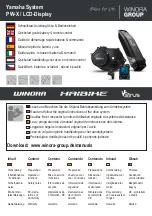
56
I General User Manual
26.7 Carbon wheels
Surface wear, change of surface, e. g. due to heat pro-
duced when braking, abrasion of brake blocks, wheel hub
or their flanks
If you are using a bike with carbon rims, bear in mind that
the braking behaviour of this material is much poorer than
aluminium rims.
Note that only approved brake blocks may be used.
26.8 Carbon fork
Fork blades on fork head, dropouts and clamping area of
quick-release device, fork head below fork cone, clamping
area of A-head stem on inside and outside
If you have changed the handlebar position, bear in
mind that the stem must extensively enclose the car-
bon section.
26.9 Carbon seatpost
Transition area between seatpost and seat tube, transition
area at head of seatpost, contact area of all screws
If other carbon parts are installed on your bike, inspect
them regularly for cracks, fractures or changes in surface
appearance.
Retapping of the thread and bearing shells and ream-
ing of the seat tube is not permitted.
As a basic rule, if a fixture is not already provided on a
carbon frame or component for an object (e.g. threaded
inserts for bottle cage), it must not be fitted. The attach-
ment of pannier racks, trailers and other fixtures are not
permitted due to the risk of breakage.
26.10 Splinters
Carbon fibres are extremely thin and hard. You should
therefore handle damaged carbon parts very carefully.
Individual fibres may detach and stick out. If these
projecting fibres come into contact with your skin,
there is a danger of them splintering off and causing
an injury.
26.11 Fastening in mounting stand
Only clamp your carbon frame at the seatpost when
fastening your carbon frame in a mounting stand, as
otherwise the clamping mechanism may cause visible or
concealed damage to the frame. If your bike has a carbon
seatpost, we recommend you replace it provisionally with
an aluminium or steel seatpost when carrying out this
work.
26.12 Transportation by car
When transporting the bike on the roof rack or on a tow-
bar cycle carrier, never attach it by its frame. Always at-
tach the bike at the seatpost, and never at the down tube,
top tube, seat tube, fork blades, steering tube, chain stay,
cranks or seat stay.
The clamping mechanism could cause visible or concealed
damage to the frame that may affect your safety. If your
bike has a carbon seatpost, we recommend you replace it
provisionally with an aluminium or steel seatpost when
transporting it.
















































